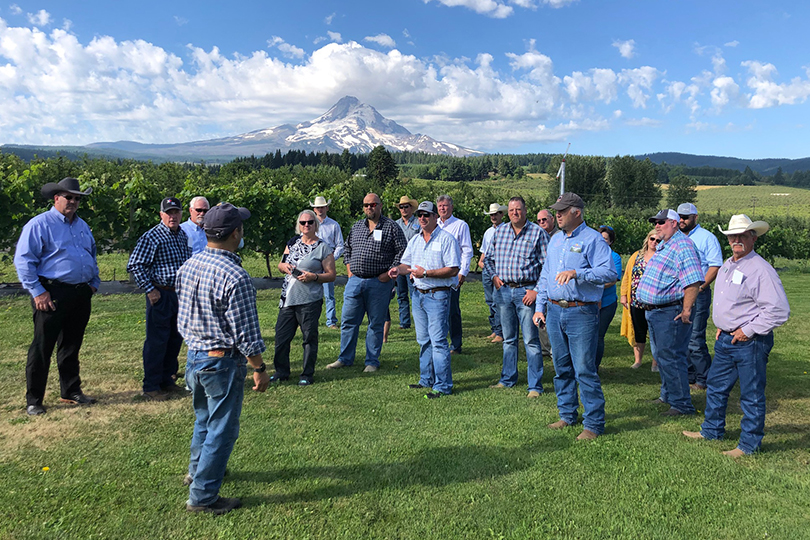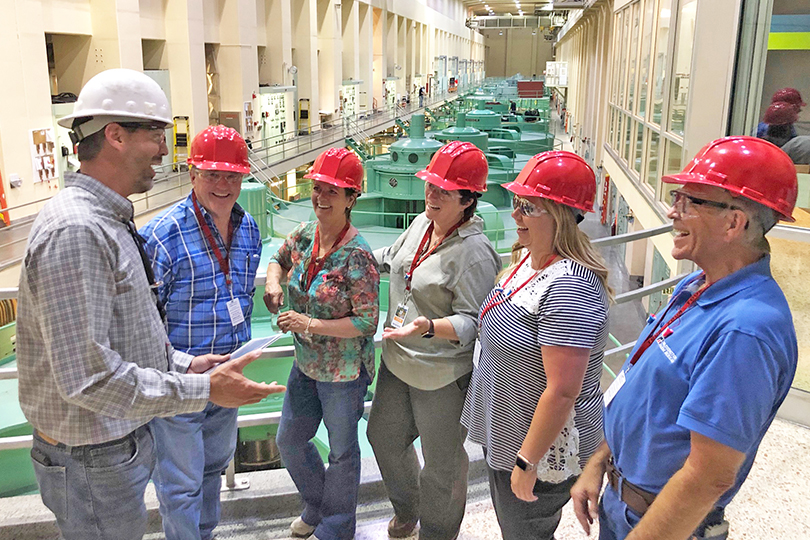By Julie Tomascik
Editor
Strong agricultural leadership doesn’t just happen in the field. It happens beyond the fence row—in local and state organizations, court rooms and Congress.
Texas Farm Bureau (TFB) can help develop those leadership and agricultural advocacy skills through its AgLead program.
“There is so much beyond the fence row that impacts agriculture,” Jamie Gipe, TFB director of Membership and Special Projects, said. “Farmers and ranchers must step out and advocate for their interests or others will do it for them. AgLead prepares participants to be a voice for agriculture at all levels.”
The 2019-2020 class was called AgLead-FarmLead, combining TFB’s two leadership programs for ages 25-40 and ages 40 and above.
For the next class, the program will be called AgLead—completing the merger of both programs to enhance leadership development and individual experiences.
TFB is currently accepting applications for the AgLead XV program.
A maximum of 20 participants will be selected for the program—10 participants between the ages of 25-40 as of Dec. 31, 2020 and 10 participants age 40 and older as of Dec. 31, 2020.
The two-year program takes participants across Texas, the country and the world to discover agriculture and leadership from a new perspective. AgLead members develop a variety of skills—leadership, communication, public policy, regulatory, advocacy and more.
AgLead XV tentative sessions include a visit to the TFB headquarters in Waco to focus on communication, leadership and technology.
The Austin session will highlight Texas government, priority issues, state demographics, political awareness and advocacy, as well as a tour of an organic farm.
On the West Coast tour stop, AgLead participants will learn about environmental regulations, labor and water issues, among others.
While in the Texas Panhandle, participants will tour area farms, and learn about issues related to energy and water, and visit with organizations, agribusinesses and universities with direct agricultural ties.
A trip to South Texas and the Rio Grande Valley will highlight border and immigration issues, local agriculture and international trade.
The Washington, D.C. session will focus on national government, priority issues, agricultural advocacy and a visit to an international embassy.
An international trip will conclude the program, exposing participants to production agriculture, infrastructure, and trade with a foreign country.
Current and previous program participants note AgLead helped strengthen their leadership skills and expand their agricultural knowledge.
“In this program, you get around a diverse group of people, and you get to hear different viewpoints on a variety of topics,” Winston Millican, a pecan farmer from San Saba, said. “You also get to see different aspects of agriculture in Texas and across the nation while developing your leadership skills. It’s a beneficial program for any farmer or rancher.”
In addition to discovering new innovative agricultural techniques, participants will discuss agricultural policy with elected officials at the state and national level.
“One of the highlights for me includes the Austin trip, because we were there during the session,” Kristin Anderson, an AgriEdge specialist for Syngenta, said. “We were able to see how our Farm Bureau team works on legislation at the Capitol, and we also met with the Ag Council to see how Farm Bureau and other agricultural groups work together during the session.”
Anderson noted her relationships with lawmakers, as well as local leaders, have strengthened.
“Being able to make connections with elected officials, the folks serving on the local water board, consumers or anyone else you meet is important, especially when trying to share the stories of agriculture,” Anderson said. “We have to be willing to speak out more. We can all make a difference and have a positive impact on agriculture’s future.”
Time is a priority investment for the program and a limited commodity for farmers and ranchers. But it’s time well spent, Millican and Anderson said. And they both agree merging the programs was beneficial.
“It’s time away from your job, your farm, your family and other commitments, but it’s also a hands-on learning experience that you can apply to all aspects of your life,” Anderson said. “In my career, a big part of what I do is support producers in South and East Texas. I was able to learn about a lot of resources Farm Bureau has available and leave that with my customers in the field, but I was also able to learn from my classmates. I could have candid conversations with those who have more experience and different experiences in agriculture, and that’s extremely valuable.”
AgLead members learn about agriculture from the farm to the factory and beyond, including visits to some of the nation’s most diversified and innovative agricultural operations, processors, packagers and marketers.
“The program helped me make connections and build relationships across the state with my fellow classmates, but also around the country through the various tour stops. I’ve learned so much about the different industries within agriculture,” Millican said. “Through AgLead, Farm Bureau gives you opportunities that you likely wouldn’t have on your own. I encourage everyone to apply.”
Participants get the tools needed to help cultivate true Texas agricultural leadership.
“With the demographics of Texas shifting to urban centers, the call for prepared agricultural leadership grows even louder,” Gipe said. “AgLead prepares participants to answer that call and advocate for agriculture from the county level to the Capitol steps.”
Participants must be a TFB member at the time of application and throughout the program, if selected.
Applications and supporting documents must be submitted by Nov. 1.
For the application, costs and more information on the program, visit texasfarmbureau.org/aglead.


